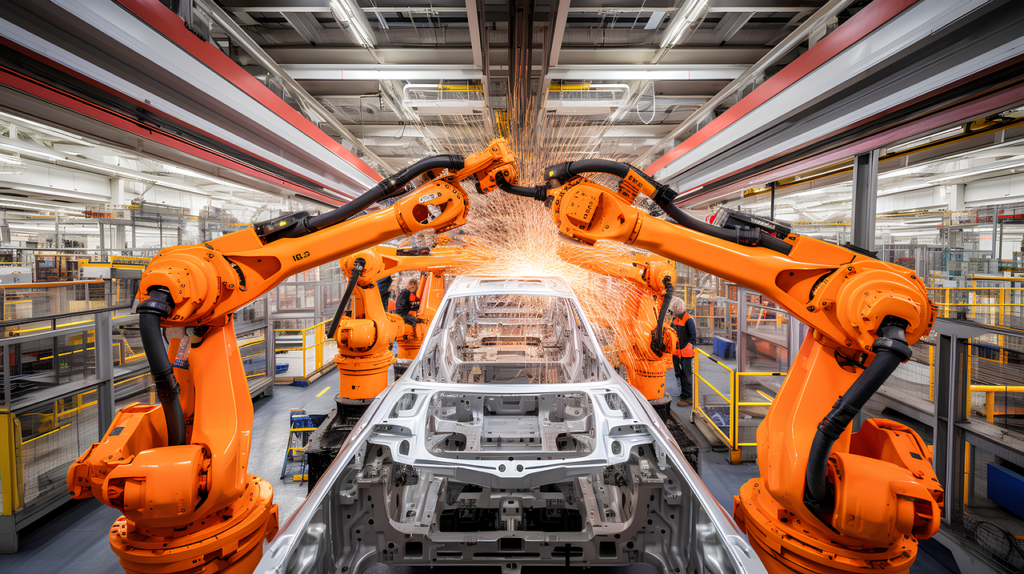The UK automotive sector has been experiencing a transition period in the last few years as it grapples with challenges and embraces new technologies. From the rapid shift towards electric vehicles to the integration of autonomous driving technology, the industry is undergoing significant changes that are reshaping the market landscape.
The good news is though that the market has clearly bounced back from the Covid-19 pandemic and the resulting supply chain issues with the latest figures from the Society of Motoring Manufacturers and Traders demonstrating the sector is firmly back on track.
Nevertheless, it is a continuously evolving sector. The impact of these changes can be seen in three key areas – the nature of job roles for the sector, the manufacturing process itself, and the supporting industries.
1. Changing job roles
The employment in all automotive sectors in the United Kingdom mainly increased from 2013 to 2020, employing around 780,000 people in 2022.

However, with the advancement of technology and AI, the skills required for an automotive career has undergone significant changes, with a major shift from manual labour to more technical skills. Here are some ways in which these skills have evolved:
- Technical Proficiency: As automotive technology becomes more sophisticated, professionals in the industry need to possess a high level of technical proficiency. They must be skilled in working with advanced systems and components, such as electric and hybrid powertrains, connectivity features, autonomous driving technologies, and advanced diagnostics.
- Data Analysis and Interpretation: The integration of AI in automobiles generates vast amounts of data. Automotive professionals now need the ability to collect, analyse, and interpret this data to optimise vehicle performance, improve safety, and enhance user experience. Skills in data analytics and machine learning have become increasingly valuable in the automotive industry.
- Software and Programming Skills: With the proliferation of software-driven features in modern vehicles, knowledge of programming languages and software development has become essential. Automotive professionals now require skills in areas such as embedded systems, software engineering, and cybersecurity.
- Diagnostic and Troubleshooting Skills: The advanced systems in modern vehicles require automotive professionals to have strong diagnostic and troubleshooting skills. They must be able to identify and resolve software and hardware issues using specialised diagnostic tools and software.
- Adaptability and Lifelong Learning: The rapid pace of technological advancements in the sector means that professionals must be adaptable and committed to lifelong learning. They need to keep up with the latest trends, tools, and technologies to remain competent and competitive in their careers.
It is important to note that along with these changes, traditional skills such as mechanical expertise and problem-solving abilities remain relevant in the automotive industry. However, the integration of technology and AI has expanded the skill set required to succeed in an automotive career.
2. Change in Manufacturing

Electric cars have brought about significant changes in the automotive manufacturing process, with electricity as a primary fuel source emerging as a pivotal solution in the pursuit of reducing dependency on fossil fuels.
This transition has created a sweeping demand for battery technology experts and professionals skills in electric vehicle technology to play an integral part of the manufacturing process.
New technology such as Advanced Driver Assistance Systems (ADAS) are altering how cars are designed and built. ADAS is an umbrella term for technologies that enhance vehicle safety and are increasingly being incorporated into vehicles to reduce road accidents.
Features such as adaptive cruise control, lane-keeping assist, and automatic emergency braking have all been seamlessly slotted into higher-end vehicles as standard, whilst even more automated self-driving technology continues to be tested.
In addition, connectivity and smart systems is a further critical area that the UK automotive sector is integrating within their manufacturing processes. These enable vehicles to communicate with each other and with infrastructure, facilitating improved traffic management, enhanced safety, and optimised driving experiences.
3. Supporting industries

Whilst there may be a decrease in the more manual labour roles traditionally associated with the automotive industry, there is a corresponding surge in demand for the industries that support the more technologically and eco-friendly sector.
A clear example of this is the electric car charging infrastructure. From specific electric charging stations, to inserting new charging points in residential properties, a whole new industry has sprung up over recent years.
Furthermore, the car mechanic role has altered to make it much more difficult for an owner with a manual at home to fix their car themselves. The level of electronics now involved in diagnosing and fixing car problems has significantly increased the number of cars required to go to a garage to be sorted rather than an owner having a go themselves on their own driveway.
Summary
The state of the UK automotive sector is characterised by both challenges and opportunities. The sector offers a variety of jobs across different disciplines, requiring diverse skills and expertise, with growth in those more technically advanced and eco-friendly roles.
Key to attracting and retaining the best talent to the sector is placing an emphasis on the benefits of being part of a dynamic and technologically advanced industry.
Moreover, whilst the future of the UK automotive sector continues to be a changing landscape, it’s also one which continues to thrive as a major global leader.
About Us
At Hiring Wizard, we have over a decade of success delivering optimised, fully branded recruitment campaigns using the very best job boards, achieving significant recruitment cost savings for a variety of businesses across the UK.
Put simply, we are brilliant at targeting and attracting the right candidate(s) for all kinds of vacancies, delivering excellent hires for a fraction of what you might pay to a traditional recruitment agency. We utilise a state-of-the-art Applicant Tracking System and have even helped our clients with their Employer Branding and dedicated careers microsites.
Our dedication to ensuring our clients’ adverts are seen by the best talent means we can deliver much more diverse, quality, and quantity, of candidates.
So if you’d like Hiring Wizard to save you significant time and costs on your recruitment, give us a call on 0161 696 8899 or email us on [email protected]